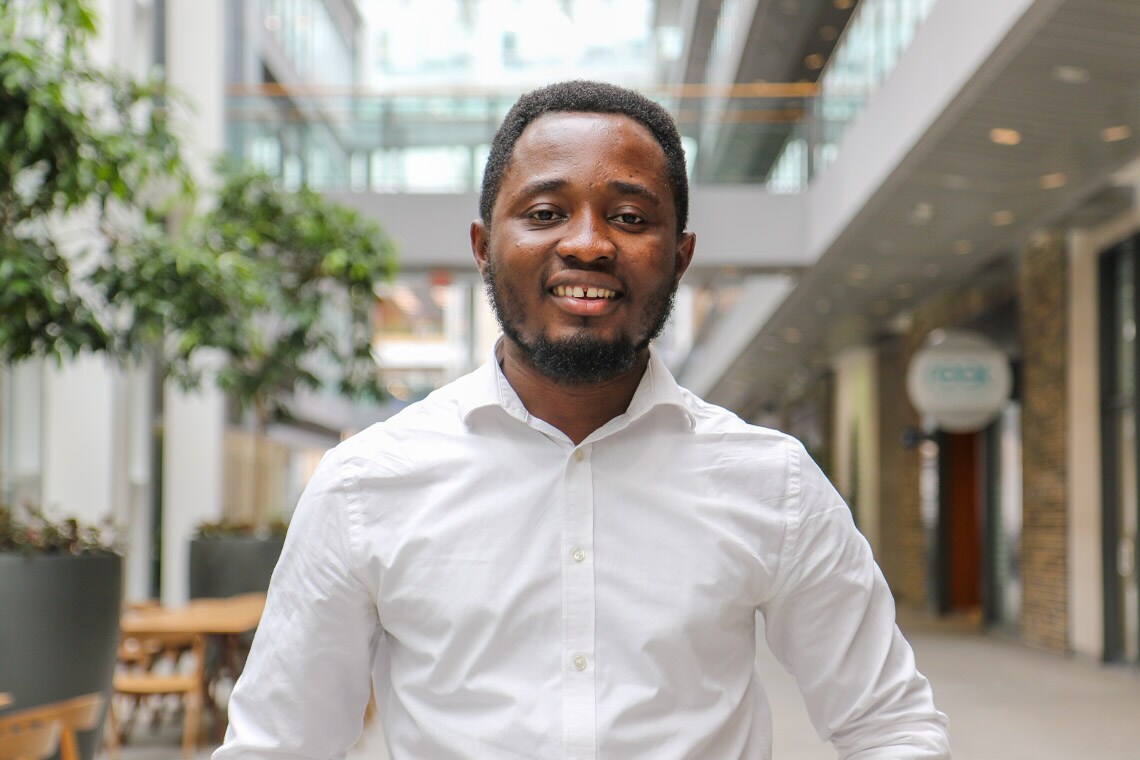Nigerian scientist Chidozie Ojobor, a doctoral student at the University of Toronto [pictured], recently won a scholarship worth $5,000 (N1, 827, 500) alongside three others from a Washington DC-based company that offers loans to international students. Ojobor, the first Canadian university student to win the scholarship, and three others were selected as winners out of 1,121 eligible applicants. According to the University of Toronto, Ojobor’s submission identified the need to address the threat of superbugs.
Ojobor lost his sister Ginika to typhoid fever in 1999, a tragedy that prompted him to study Microbiology at the University of Nigeria. He graduated with First Class Honours in 2012 and was offered a teaching job in the same university. He emigrated to Canada in 2016 for his PhD and he’s set to complete the programme in the department of Molecular Genetics of the University of Toronto next year.
Son of an engineer father (now deceased) and a primary schoolteacher, Ojobor is originally from Amufie in Enugu-Ezike, Igbo-Eze North LGA of Enugu State.
A foundation in his home state, Nsukka Journalists Foundation, engaged him in a conversation via WhatsApp on March 8, 2020. Excerpts:
NJF: Explain to us what the recognition (in July 2019) was all about.
Ojobor: I’d been recognized for some interesting discoveries I’ve made about combating antibiotic-resistant bacteria. It was a scholarship recognition from a U.S.-based financial organization (MPower Financing) rewarding individuals making a mark in their respective fields.
NJF: What’s the worth of the recognition to you?
Ojobor: For me, it means more than the previous recognitions I’ve had. The award came because of the interesting findings I’ve had about fighting resistant superbugs. It feels great when people identify with what you do. Also, because I had lost a loved one in the past due to drug-resistant bacteria. So I’m happy I’m now contributing to this field.
NJF: What are superbugs?
Ojobor: Superbugs are bacteria that have developed brilliant strategies to resist antibiotic action on them.
NJF: What were your findings?
Ojobor: I’m using proteinaceous molecules called “tailocins” to target resistant bacteria. The highpoint of my finding is that in any case bacteria develop resistance, I can genetically engineer the tailocins to overcome the resistant superbugs. This way, we can keep up with the way bacteria evolve to develop resistance.
NJF: Is there any plan to patent this scientific discovery? Are you in touch with Nigeria’s Federal Ministry of Science and Technology?
Ojobor: No, I’m not in touch with the Ministry of Science and Tech back home yet. We’re working on publishing the papers really soon. In terms of patents, it makes more sense that it’s done here, since the work is being funded by my country of residence (Canada).
NJF: Before your discovery, the problem had defied solution from western scientists, right?
Ojobor: Oh! Science mostly done collaboratively. Although these are my findings, I’m being supervised by a Canadian professor who has been very supportive. And, yes, antibiotics resistance is a big problem. By 2050, more than 10 million people might die from it, if nothing is done. But we hope this won’t be the case, as various groups are working on alternative antibiotic therapeutics.
NJF: Do you agree you’ve been able to achieve this because of the environment? What indeed is the problem of our dear country vis-à-vis learning and research and how can it be addressed?
Ojobor: I think the answer is yes and no. I had my rudimentary education in Nigeria and that definitely prepared me for this, thanks to my teachers at the department of Microbiology, UNN (who eventually became my senior colleagues). The major problem with the Nigerian learning environment is the lack of adequate facilities to practise science. We need working labs, electricity, adequate grants, funding and so on. So, yeah, this way environment plays a vital role.
NJF: You’re just 29. How would you encourage budding scientists from your home state to rediscover their talents?
Ojobor: I’m currently working with a network of my friends, who’re living and pursuing a PhD in the U.S. and Canada, on mentorship platforms for young and brilliant talents back home. This will kick off in the summer. The idea is to see how to guide and point opportunities to the young and brilliant talents from Nsukka and beyond.
I believe NJF can be instrumental in the plan I have highlighted above. Some of us here have bright kids and, as journalists, can best explain these plans to our people. What we’re working on is pretty solid, and I should be letting us know in due time.
NJF: Where did you receive secondary education? Did you have scientific traits in you there or at UNN?
Ojobor: I was at CMS Grammar School, Lagos. Oh yeah, I represented CMS in several science competitions and graduated as the best science student in 2006. So I would say I’ve always loved science.











